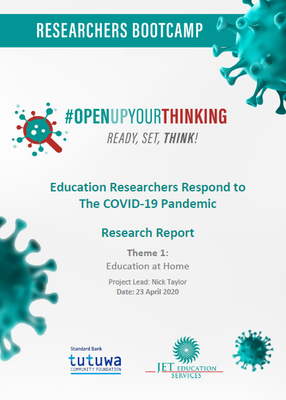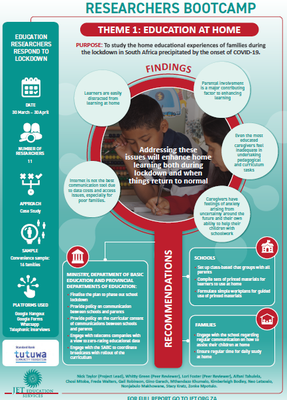Theme 1: Education at home
A qualitative piece on the different experiences of individuals during this lockdown, particularly with regards to education.
Lead Researcher: Dr. Nick Taylor, JET Education Services
Peer Reviewer: Dr Whitty Green, Department of Higher Education and Training (DHET), Lori Foster
Researchers: Aifani Tahulela, Chosi Mtoba, Freda Walters, Gail Robinson, Gino Garach, Mthandazo Khumalo, Kimberleigh Bodley, Neo Letsoalo, Nonjabulo Makhowane, Stacy Kratz, Zonke Mpotulo
Download the final report and infographic
|
|
|
Proposed Method
Each member of the Workstream undertakes a study of one or more families (which could include his/her own) and their educational practices over the period of the study.
The case study should include:
- Description of the demographics of the household concerning:
- The children: number, gender, age, grade level, school
- The adults: number, gender, age, education, occupation
- The house: location, type, size, books, other educational resources
- Does the household/caregiver(s) provide a structured educational programme for the child/children in the house? If so describe the programme: content, supervision, compliance by children. If there is no structured programme, what do the children do all day?
- Dilemmas and challenges faced by caregivers - between a) their teleworking obligations and b) providing assistance to online learning of children (high load of school assignments). Unequal access to digital devices and broadband connectivity in many households: between zero computers to difficult shared access of all pupils in the household to 1-2 devices / computers.
- Access to resources: Describe the role of books and technology, either within the programme or independently if there is no programme.
- The comeback of (new) TV-school: in several EU countries and Turkey - interesting practice launched in response to Covid-19. Interactive TV-school programmes - directed to learners + parents and benefiting teachers as well. In Turkey teachers highly appreciate the new TV-school - in remote areas teachers have now easy access / contact with newest / good pedagogical practice.
- Parents’ feedback is worth analysing (could be useful hints for teacher training, curriculum improvements): on their perceived a) weaknesses and issues related with teachers’ interaction with pupils, b) “excessive” workload in times of crisis and c) problems of connectivity and user-friendliness of online learning platforms.
- If possible, talk to the children regarding their feelings towards the programme or, if there is no programme, what they spend their time doing (what do they read, watch on TV, access on the internet). Peer interaction: within and outside the household.



